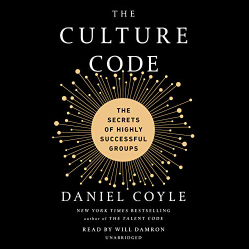The Culture Code: The Secrets of Highly Successful Groups by Daniel Coyle
Since I do most of my reading on a Kindle, my TBR pile is often misleading. I don’t usually have an order to what I read, and I frequently forget when or why I purchased a book. As I looked at the cover of The Culture Code: The Secrets of Highly Successful Groups by Daniel Coyle on my Kindle, I had no recollection of when or why I bought the book. I was pleasantly surprised.
Coyle begins by talking about culture and what it meant in the early days of human history. He then explains how our brains are still wired to respond to culture in the same ways – emotional, physical, and psychological safety – even though we are now at work instead of in hunter-gatherer nomadic groups.
The Culture Code shares interviews with several people who have built outstanding teams and cultures, from Google to Dave Cooper, the unofficial father of the SEALs. Several conversations with Cooper show how emotional, physical, and psychological safety in groups creates cohesion, action, and adaptability within those groups.
“Make Sure the Leader Is Vulnerable First and Often: As we’ve seen, group cooperation is created by small, frequently repeated moments of vulnerability. Of these, none carries more power than the moment when a leader signals vulnerability. As Dave Cooper says, I screwed that up are the most important words any leader can say.”
Coyle shares Cooper’s program of AARs – After Action Reviews – with his team and how candor is the most crucial part of building a successful culture. It’s not about positivity, cheerleading, or a you-can-do-anything attitude. Creating a culture is about modeling the behavior you want to see and not punishing it when you see it.
There are many helpful tips for leaders within these pages. It’s also worth noting that the subtext of Coyle’s The Culture Code shows that everyone and anyone can be a leader. Leadership isn’t about authority, titles, or deference to another person; it’s about honesty, vulnerability, and consistency.
Having read a fair few books on companies, teams, and organizational culture, I thoroughly enjoyed the book. I appreciate the punchiness of the book. Too many books on team culture highlight tired stories of achievement in the 1950s or focus on one particular success story that is unlikely to be repeatable at another company. Coyle shows real examples and the themes that tie Google and the Navy SEALs together in a flexible, repeatable way. I look forward to instilling some of the techniques where I work.
Book Club Reading Guide: The Culture Code: The Secrets of Highly Successful Groups by Daniel Coyle

